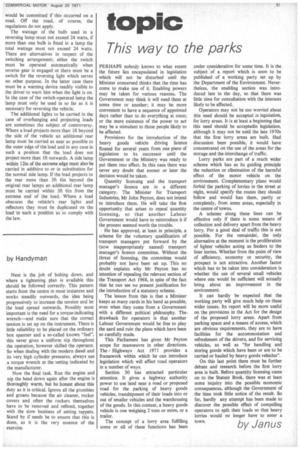topic
Page 33

If you've noticed an error in this article please click here to report it so we can fix it.
This way to the parks
PERHAPS nobody knows to what extent the future lies encapsulated in legislation which will not be disturbed until the Minister concerned thinks that the time has come to make use of it. Enabling powers may be taken for various reasons. The Government may think it will need them at some time or another; it may be more convenient to have a sequence of appointed days rather than to do everything at once; or the mere existence of the power to act may be a stimulant to those people likely to be affected.
Provisions for the introduction of the heavy goods vehicle driving licence floated for several years from one piece of legislation to its successor until the Government or the Ministry was ready to put them into effect. In this case there was never any doubt that sooner or later the decision would be taken.
Quantity licensing and the transport manager's licence are in a different category. The Minister for Transport Industries, Mr John Peyton, does not intend to introduce them. He will take the first opportunity that arises to repeal quantity licensing, so that another Labour Government would have to reintroduce it if the process seemed worth the trouble.
He has approved, at least in principle, a scheme for the voluntary qualification of transport managers put forward by the (now inappropriately named) transport manager's licence committee. Without the threat of licensing, the committee would probably not have been set up. This no doubt explains why Mr Peyton has no intention of repealing the relevant section of the Transport Act 1968, in spite of the fact that he can see no present justification for the introduction of a statutory scheme.
The lesson from this is that a Minister keeps as many cards in his hand as possible, even when they come from a Government with a different political philosophy. The. drawback for operators is that another Labour Government would be free to play the card and ruin the plans which have been so carefully made.
This Parliament has given Mr Peyton scope for manoeuvre in other directions.
The Highways Act 1971 provides a framework within which he can introduce legislation which will affect road operators in a number of ways.
Section 30 has attracted particular attention. It gives a highway authority power to use land near a road or proposed road for the parking of heavy goods vehicles, transhipment of their loads into or out of smaller vehicles and the warehousing of the goods. In this context, a heavy goods vehicle is one weighing 2 tons or more, or a trailer.
The concept of a lorry area fulfilling some or -all of these functions has been
.under consideration for some time. It is the subject of a report which is soon to be
published of a working party set up by the Department of the Environment. Nevertheless, the enabling section was intro duced late in the day, so that there was little time for consultation with the interests likely to be affected.
Operators may not be too worried about this need should be accepted in legislation, for lorry areas. It is at least a beginning that this need should be acceptedin legislation, although it may not be until the late 1970s that the first lorry areas are built. Had discussion been possible, it would have concentrated on the use of the areas for the storage and the interchange of traffic.
Lorry parks are part of a much wider scheme which has as its guiding principle the reduction or elimination of the harmful effect of the motor vehicle on the environment. Complementary plans would forbid the parking of lorries in the street at night, would specify the routes they should follow and would ban them, partly or completely, from some areas, especially in the centre of towns.
A scheme along these lines can be effective only if there is some means of collection and delivery apart from the heavy lorry. For a good deal of traffic this is not possible. For the remainder, the only alternative at the moment is the proliferation of lighter vehicles acting as feeders to the liner lorries. Whether from the point of view of efficiency, economy or security, the prospect is not attractive. Another factor which has to be taken into consideration is whether the use of several small vehicles where one would be sufficient will actually bring about an improvement in the environment.
It can hardly be expected that the working party will give much help on these wider issues. Its report will be more useful on the provisions in the Act for the design of the proposed lorry areas. Apart from parking space and a means of access, which are obvious requirements, they are to have facilities for the accommodation and refreshment of the drivers, and for servicing vehicles, as well as "for handling and storing goods which have been or are to be carried or hauled by heavy goods vehicles".
On this last point there must be further debate and research before the first lorry area is built. Before quantity licensing came on to the Statute Book, there was at least some inquiry into the possible economic consequences, although the Government of the time took little notice of the result. So far, hardly any attempt has been made to discover the possible effect of compelling operators to split their loads so that heavy lorries would no longer have to enter a
town. by Janus




















































































